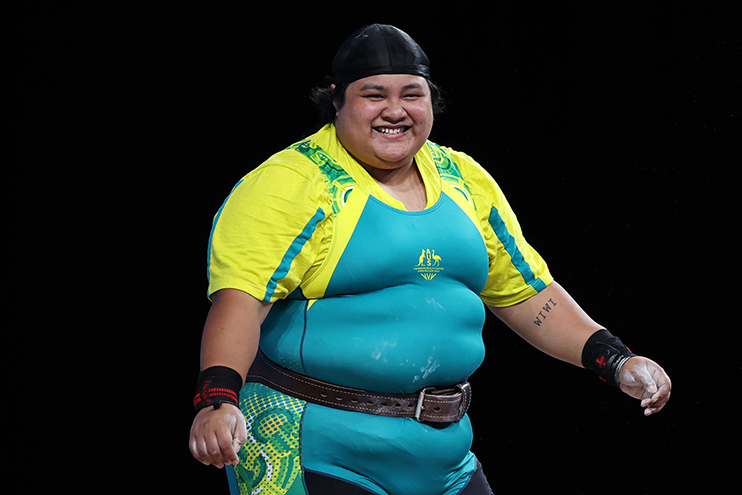
Ian Chadband / AAP News
The Gold Coast 2018 silver medallist adds a second career medal to her personal collection, this time a bronze in Birmingham.
Australia’s strongest woman Charisma Precious Amoe-Tarrant is the pride of Nauru – and has dedicated an emotional super-heavyweight weightlifting medal to both nations.
After an exhilarating contest won by England’s new sporting cult heroine Emily Campbell, Amoe-Tarrant – who won silver for her Pacific birth island Nauru four years ago – took bronze in the green and gold.
Looking tearfully skywards, recalling her late mum whose death when she was 12 prompted her family’s relocation to Australia and honouring a supportive uncle who recently died, Amoe-Tarrant declared: “I couldn’t help looking up to both up there. All the lifts were for them.
“At the end of the day, I’m Australian and I’m also Nauran, so I’m representing both countries. I’m proud to be Australian and I’m also proud to be Nauran – and no-one can take that away from me.”
The 25-year-old, 154kg powerhouse produced a magnificent performance in the over-87kg category despite admitting to having f elt “a lot of pressure” following recent knee and elbow injuries which were still troubling her.
Lying sixth after the snatch, she cleaned 139kg for a total of 239kg, as the National Exhibition Centre crowd cheered England’s Olympic silver medallist Campbell, who hoisted a Games record 286kg, to the rafters.
“Honestly, the atmosphere here was so good,” said Amoe-Tarrant, who admitted that she had experienced a bit of a backlash from some Naurans in the world’s third smallest nation after she decided to compete for the adopted country she felt had given her so much.
“If I’m being honest, I had that (acrimony), but I had to tell them, ‘I’m one of you too, I’ve got Nauran blood running in me’. It took a while but they’re coming back now.”
It felt fitting that Amoe-Tarrant, whose middle name is Precious, should be congratulated by an honoured guest at the NEC – the now 86-year-old Commonwealth weightlifting legend Precious McKenzie, who won four consecutive golds between 1966 and 1978.
In the equivalent battle to find the Commonwealth’s strongest man, Royal Australian Navy combat services officer Suamili Nanai finished a creditable sixth in his first major competition, hauling a combined 361kg.
None of the big men, though, could cope with Pakistan’s new champion Nooh Dastgir Butt, who ended the five days of weightlifting competition with a final Games record of 405kg – the equivalent of hoisting a couple of grand pianos within two hours.
Earlier, Jackson Young, in the men’s heavyweight 109kg, had also looked at a weight far beyond anything he’d ever hoisted before – a 211kg clean and jerk – and said to himself: “Mate, you gotta risk it for the biscuit.”
Alas, he ended with just the crumbs.
But the big Sydneysider had no regrets at going for a last-lift gamble in the clean-and-jerk which would have earned him a bronze, as he settled for fifth place.
“It would have been a bronze, a Games record, an 11kg PB,” reflected the 25-year-old one-time rugby league player who took up American football and started lifting to strengthen those gridiron ambitions.
“I didn’t come here to not at least put a medal on the bar – I’m glad I did even if I missed it.”
The Australian weightlifting team ended up with a bronze, two silvers and the gold won on Tuesday by Eileen Cikamatana in the 87kg event.
